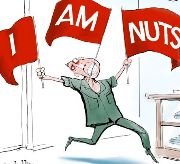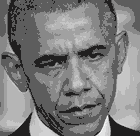|
Autocratic countries tend to have very conservative cultures. Women are second-class citizens, minorities are repressed, gays are bullied, etc. Democracies by contrast are more liberal and tolerant. Why is this? The answer I have marries Bueno de Mesquita's selectorate theory with Bob Altemeyer's concept of the authoritarian personality. What we think of as a dictatorship, Bueno de Mesquita thinks of as a "small-coalition regime". The regime is structured in such a way that the ruler's hold on power depends on the support of just a small fraction of the population. By contrast, a democracy is one where the ruler must gain the support of a broad section of the population in order to survive in power. If you are a dictator and thus need only a small fraction of the people to cling to power, which is the best fraction to appeal to? The answer is the authoritarian citizens. Authoritarians, as Altemeyer describes them, are people who believe in conformity and submission to authority. Authoritarians want society to be hierarchical, and tend to look down upon women and minorities (and really anyone who doesn't not conform to what they think of as normal). Altemeyer notes that it's pretty easy for a dictator to acquire and hold the support of authoritarians. He simply needs to claim to share their values and promise to impose them on the rest of society, and like that, the authoritarians will give him their solid support and overlook his flaws. Moreover, Altemeyer has found that authoritarians are actually drawn to domineering figures. They want to be ruled by a strongman. The above strategy does not work in a democratic society because there are not enough authoritarians in the population to form a sufficiently large support base. In most western societies, only about 10% of the population is authoritarian (in America it's about 26%). To form a sufficiently large support base to gain power, politicians are forced to appeal to centrists and liberals. And what do centrists and liberals want? More rights for women, gays, and minorities. What does everyone think of my take?
|
|
|
|

|
| # ? May 14, 2024 00:09 |
|
One major reason, is that the wealth of democracies are almost never derived from export of a raw material such as oil. If your country generates a fuckton of wealth from just digging poo poo out of the ground and selling it to other countries and nothing else, you don't need to care whatsoever about your citizens beyond the basics when it comes to deciding how to spend the money. All you need to do is keep the population subdued and the right people paid off and you get to stay in power. This also means coups are more likely because power is more concentrated, and so typically these societies need extremely strong security services controlled by a very small cadre of people who control all of the treasury, with any dissent put down as soon as it's discovered. This is why autocracies have such illiberal laws, because they are inherently paranoid and for good reason. Therefore, if you live in a country where the needs of the population don't align with the needs of the elites, such as when you only care about enslaving people to work in dangerous mines, rigs, or similar, it's generally a poo poo experience for the average civilian. By contrast when the majority of the wealth is derived from advanced industries and services, in order to run these industries you need to have liberal laws to keep the population educated and well fed because those are the only people who can work in those industries. Happy educated workers are extremely productive compared to starving peasants, and so in these societies power tends to be more decentralized and this surfaces itself ultimately as democracy. On top of that, any actual coup attempts are unlikely in a democracy, not just because power is fractured amongst many, but because a civil war would result in the destruction of the mechanism by which the country derives its wealth. As a result, a grossly funded gestapo tends to be a waste of money because honestly when people have all the things and freedoms they need and want (for the most part), they aren't likely to be a threat to the state. So the caveat is that this is probably a massive over-simplification with exceptions to the rules, but historically whether a country is liberal or not mostly comes down to the natural resources the country has access to, and its geopolitical situation. qhat fucked around with this message at 07:04 on Oct 25, 2022 |
|
|
|
I wasn't talking about education or healthcare, I was talking about tolerance and egalitarianism. Why are democratic societies more tolerant and egalitarian?
|
|
|
|
Because they are more educated and healthy.
|
|
|
|
No, it's a consequence of broad political participation. The reason that people in democracies are more educated and healthy is that the people vote for better education and healthcare, and the rulers have to satisfy these demands or else they lose re-election. The people in democracies also vote for more equality and tolerance, because in a large-coalition regime, the ruler is forced to listen to the demands of progressives, as well as build more a inclusive society to attract the votes of minorities.
|
|
|
|
You're not considering why those rulers even listen to those votes at all. Why not just ignore the votes and send the entire budget into the hands of the military and security services? Money spent on citizens is ultimately money not spent on brute force. It's because the military in and of itself is not productive beyond protecting the wealth generation of the country. I feel like I'm repeating myself, but if the wealth is derived from the productiveness of its citizens, then it is in the interest of the government to actually keep those citizens educated and happy because that means more productive workers which means greater money generation and so on and so forth. So the government actually listens to the population because the needs of government just so happens to align with the needs of the population. If the wealth generation is in general not dependent on the happiness or health of the citizens at large, then guess what, the government doesn't end up spending anything on education or healthcare for the population because it's a waste of money compared to paying the military or whoever, and also because educating your population and keeping them healthy and keeping them connected makes a revolt more likely than if you just starved them. If your argument is just "no it's because people vote for things and government gives them those things because liberal governments are just gracious people", and that's what you're sticking to, then I think we're done here since you're failing to comprehend some basics about how power of a government is derived at all.
|
|
|
|
Kurzon posted:No, it's a consequence of broad political participation. The reason that people in democracies are Ok sounds like you felt you had the answer when you asked the question so was there a specific intent in asking
|
|
|
|
Staluigi posted:Ok sounds like you felt you had the answer when you asked the question so was there a specific intent in asking go back and read the first post in this thread for a fun surprise re: OP: the biggest reason autocratic countries tend to be culturally conservative is that The Old Days were, almost universally, a time when wealthy aristocrats controlled every aspect of a country's politics, top-to-bottom, with no pretense of input from any other groups. as such, instituting a regime of central control by that small group alone is inherently wrapped up in rhetoric about going back to the good old days. when putting them back on top doesn't actually fix any of the problems inherent to modern life, those same aristocrats are obliged to pretend that it's the incompleteness of the return to the past that is why people are still unhappy, because the alternative is them forfeiting their grip on power, and they not only will they very frequently do kill a large number of people to prevent that from happening. the idea that "authoritarianism" is some kind of moral contagion experienced by segments of the population seemingly at random is ideologically convenient horseshit, but horseshit. people become 'authoritarians' when they see an advantage to them, personally, in authority flexing its muscles on their behalf. examples range from records of street-level SS captains in Nazi Germany getting extremely pissy that the only way they could get anyone outside the Party to participate in jew-oppression was by telling people they could loot Jewish businesses, to nice, polite American liberals demanding that desegregation activists be brought to heel before their children have to go to the same school as a black person. politically speaking, nobody takes a look at the government accomplishing their core political goals violently and says "no don't do that that would be wrong." it's just that when my team does it, it's regrettably necessary use of force, and when your team does it, it's authoritarianism.
|
|
|
|
You’re surprised that in a highly hierarchical society where the hierarchy is based on power that women and ethnic minorities would be treated as lesser? It’s all very coherent in an authoritarian mindset. Just as the ruler is the head of the country, there to issue orders and be obeyed, the husband is the head of the household and is to be obeyed in his own house. Likewise, there’s a whole societal hierarchy where individuals with less power are expected to yield to individuals with more power, and hence there isn’t even any pretending that low-status, poorer ethnic minorities are equals with members of social groups of a higher rank.
|
|
|
|
Autocrats are generally not young people who take power through their sheer goodwill toward humanity plus willingness to compromise and listen to alternative viewpoints. You're already looking at somebody willing to do the things necessary to take power, hold onto it when contested, and cement themselves into a position above all others. Once solidly in power with organizations like police, military, and political leadership kept loyal and happy (again, organizations that tend to be more conservative) the need to even appear to give a poo poo about whatever dumb new thing the kids think is important starts to evaporate while the entire power structure gets dragged along for the ride with anyone in or seeking positions of power trying to please the boss or his sycophants (alternatively getting removed by the boss or his sycophants). Then the boss and the sycophants surrounding him get older and increasingly out of touch. Warbadger fucked around with this message at 04:38 on Oct 26, 2022 |
|
|
|
Both autocracies and social conservatism are about control.
|
|
|
|
autocracies got obliterated by outsiders
|
|
|
|
Kurzon posted:I wasn't talking about education or healthcare, I was talking about tolerance and egalitarianism. Why are democratic societies more tolerant and egalitarian? tolerance towards obeyism?
|
|
|
|
|
people are a lot happier in a democracy
|
|
|
|
|
Liberté, égalité, fraternité Most. Modern democracies have at least some roots based in the French, and the french were big on liberalism.
|
|
|
|
I don't know but thank you for asking this question as it's taboo. I believe the 'liberal' part of liberal democracy is more important than the 'democracy' part. I'd rather not be able to vote but to be secure in that my rights and the rights of others such as women, LGBTQ+ people, and racial minorities would be protected rather than bear the possibility of an elected leader taking all that away. I think this could become an interesting thread.
|
|
|
|
Why are democracies stronger than autocracies
|
|
|
|
|
Is it liberal to jail protestors with whom the state disagrees with?
|
|
|
|
Democracies have less brain disease
|
|
|
|
|
qhat posted:So the caveat is that this is probably a massive over-simplification with exceptions to the rules, but historically whether a country is liberal or not mostly comes down to the natural resources the country has access to, and its geopolitical situation. For example, you see this in Russia where economic stability fostered the development of a new class in Moscow and St. Petersburg who have a more liberal orientation and see integration with the West as in their interest: it grows the market for them which will help them rise up. But the more that class develops, the more of a threat they pose to the natural resource tycoons and military-industrial securitocrats who control the state. The war is in those classes' interest not only because Ukraine provides more opportunities for plundering natural resources (and thus reproduce themselves), and not only because they can clean house internally and select their replacements as they begin to retire, but because they can throttle Russia's development. To develop a 21st-century economy is too complicated for them.
|
|
|
|
BrutalistMcDonalds posted:Well, natural resources are physically located in the ground in particular places, so a social organization that emerges from an economy built on that tends to skew towards conservatism and xenophobia, because you don't want outsiders and others "not from around here" dividing up the land and the natural resources (which can only be divided so many times before it's worthless). It's like, here's an oil well, now draw a circle around it and stick a "KEEP OUT" sign on the border. More developed economies built on services or software, for example, tend towards liberalism because physical borders and barriers are an obstacle to their expansion, which is more or less infinite. What does happen though is that it's easier to get people to go along with that wealth hoarding if they're distracted by manufactured threats, it's easier to run a repressive state if the elite have access to lots of resources, and it's also easier to run it if those resources are kept out of the hands of normal people.
|
|
|
|
BrutalistMcDonalds posted:Well, natural resources are physically located in the ground in particular places, so a social organization that emerges from an economy built on that tends to skew towards conservatism and xenophobia, because you don't want outsiders and others "not from around here" dividing up the land and the natural resources (which can only be divided so many times before it's worthless). It's like, here's an oil well, now draw a circle around it and stick a "KEEP OUT" sign on the border. More developed economies built on services or software, for example, tend towards liberalism because physical borders and barriers are an obstacle to their expansion, which is more or less infinite. This doesn't really square with reality, at least in the sense that Nazi Germany doesn't seem to adhere to this principle. Sure, Weimar Germany wasn't a "services and software" economy by a long shot, but Hitler's mission was specifically to target nations with natural resources he saw as important for an autarkic Germany, and he transformed a relatively liberal for the time democracy into a totalitarian nightmare police state in order to achieve that long-term goal.
|
|
|
|
Caros posted:Liberté, égalité, fraternité The First French Republic was only a democracy in name. Its associated revolution overthrew the absolutist Bourbon monarchy and formed a republican government in its place, effectively replacing one oppressive regime with another. In other words, the First French Republic was not the beacon of democracy that the masses believed it to be. Instead, despite its endorsement of democratic and egalitarian ideals (such as citizenship rights for women and the emancipation of Jews), Revolutionary France failed to implement said ideals, as reinforced by its oligarchic government, which forbid women, Jewish people, and racial minorities from serving in the National Convention, as was customary for the time. Likewise, a vast majority of high-ranking government officials were wealthy aristocrats hailing from the top one percent, contradicting the revolution's mission statement of ridding France of an oppressive social hierarchy. Ironically, the only significant distinction between the ruling classes in the French Republic and Kingdom is that the former were leftist secular republicans, whereas the latter were right-wing theist monarchs. Besides this difference in political classification, the usurpers and those overthrown were equally affluent and just as corrupt. However, all of this pales in comparison to the Jacobin's infamous Reign of Terror, in which the Committee of Public Safety suppressed free speech and dissenting opinion through the mass execution of confirmed or suspected treasonists. Ultimately, by Robespierre's own assassination in July 1794, 10,000 needlessly died at the hands of the French government, giving credence to the notion that left-wing governments (such as republican France) were still capable of cruelty and totalitarianism, even if less common when compared to their conservative counterparts. Waddle Bourgeoidee fucked around with this message at 03:46 on May 12, 2024 |
|
|
|
Democracies are more liberal than autocracies because: “Democracy is on the one hand the characteristic fruit of a bourgeois civilization; on the other hand it is a perennially valuable form of social organization in which freedom and order are made to support, and not to contradict, each other.” So it either democracy is supported by bourgeois, liberal ideals, eg the traditional foundations of modern democracies from the enlightenment or it is supported from the experiential participation in democracy by those with a more socialist bent. Either of those are going to value freedom more than an autocracy. Bar Ran Dun fucked around with this message at 03:09 on May 13, 2024 |
|
|
|

|
| # ? May 14, 2024 00:09 |
|
Demented Democracies
|
|
|
|


























